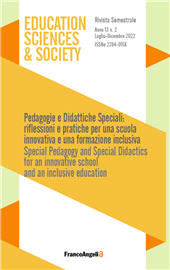Remote cooperative teaching and mutual enrichment as an inclusive experience of internationalization in university
284-296 p.
The study offers an example of an inclusive internationalization of university teaching through a digital platform. Inclusive and comprehensive internationalisation requires us to reframe our thinking, also taking advantage of the opportunities offered by digital transformation and exploring new methods of achieving internationalisation goals. Our research investigates how mutual enrichment and cooperative teaching practice among lecturers supports selfefficacy and motivation to study which international research showed to be positively affected by internationalisation experiences. Participants were students at Niccolò Cusano University in Rome and students on the undergraduate Master of Education that attended three sessions delivered remotely by a multilanguage teaching team from both universities. Students were also engaged in collaborative tasks in order to further stimulate collaboration and knowledge exchange.
Data were collected before the beginning of the project (T0) and at the end of it (T1). Results showed that two of the subscales of the perceived selfefficacy scale in managing complex problems (Context Analysis and Emotional Maturity) were significantly different between the two administrations, with an improvement in T1. [Publisher's text].
The study offers an example of an inclusive internationalization of university teaching through a digital platform. Inclusive and comprehensive internationalisation requires us to reframe our thinking, also taking advantage of the opportunities offered by digital transformation and exploring new methods of achieving internationalisation goals. Our research investigates how mutual enrichment and cooperative teaching practice among lecturers supports selfefficacy and motivation to study which international research showed to be positively affected by internationalisation experiences. Participants were students at Niccolò Cusano University in Rome and students on the undergraduate Master of Education that attended three sessions delivered remotely by a multilanguage teaching team from both universities.
Students were also engaged in collaborative tasks in order to further stimulate collaboration and knowledge exchange. Data were collected before the beginning of the project (T0) and at the end of it (T1). Results showed that two of the subscales of the perceived selfefficacy scale in managing complex problems (Context Analysis and Emotional Maturity) were significantly different between the two administrations, with an improvement in T1. [Publisher's text].
Forma parte de
Education Sciences & Society : 2, 2022-
Artículos del mismo número (disponibles individualmente)
-
Información
Código DOI: 10.3280/ess2-2022oa14858
ISSN: 2038-9442
KEYWORDS
- internationalization, mutual enrichment, inclusion, cooperative teaching, selfefficacy, special educational need


